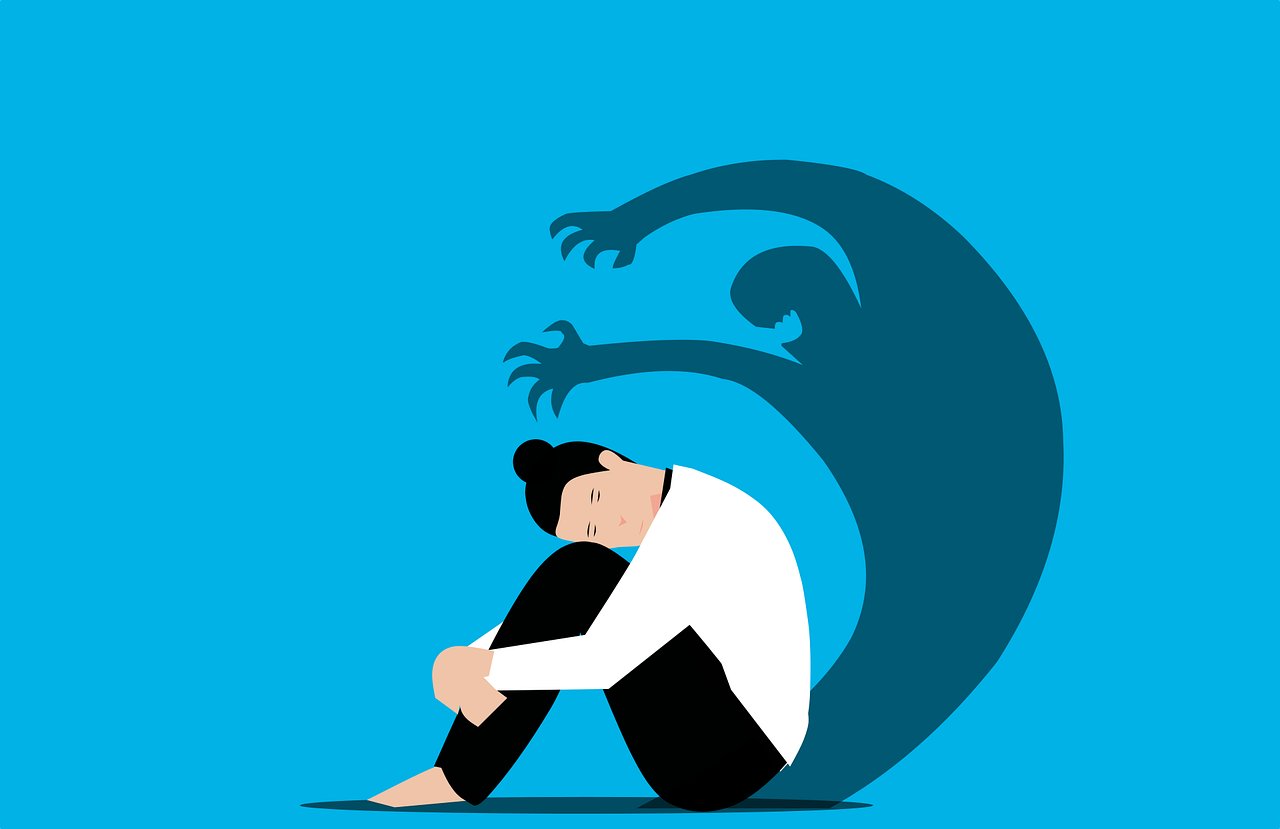Are you usually a carefree and happy go, lucky person? Do you typically look to the glass being half full? Are you now with all this uncertainty feeling a bit depressed, nervous, or isolated? I want to assure you that you are not alone
Insomnia: The Struggle Within
Tired, like all of the time, because you just can’t sleep. Anxious, stressed, and unsure where to turn? If you struggle with insomnia, you’re not alone. Insomnia is one of the most common disorders in individuals. With all of today’s stress, at least 25 % of adults and children struggle with getting a good night’s sleep. We’ve got some handy tips & tricks for getting better shut eye.
Teens are More Prone to Anxiety
Teens are affected with higher rates of anxiety, with nearly 1 in 3 teens meeting the criteria for an Anxiety Disorder.
For The Love of Fido: Pets and Your Mental Health
What Does Thanksgiving Look Like?
Managing Anxiety During the Holiday
Do you find that anxiety or even seasonal depression starts to rear its ugly head sometime in late October to mid-November? If you do, you are not alone! Between late November and the New Year, we enter the business of holiday season, causing many to manage anxiety, stress, and depression. Let's learn how to manage it well.
Tips on Dealing with Separation Anxiety
Do not, I repeat, Do NOT sneak away when your child is not looking. This may seem like the easier way to leave your household, but it reinforces to your child that if they are not alert scary things will happen. They need to mentally prepare for being alone, not feel panicked when they realize they are alone.
The Way You Think May Be Detrimental To Your Mental Health Part 2- How to Change that!
Last week we discussed some common cognitive distortions that may be adding to your anxiety or depression. To get caught up, if you missed last week's blog read that first, here! Have you been able to identify some common thought errors? If you’re experiencing any of these distortions,
Here are 8 steps to stop or slow down your Cognitive Distortions:
1. Recognize and isolate the thought: Look for absolute words, like ‘always’, ‘never’, or ‘can’t’ these are usually clues you’ve got a Cognitive Distortion going on. So are really strong negative words directed at yourself like, ‘hate,’ ‘stupid’ or ‘loser.’ Try and use these words sparingly, if at all.
2. Write it down daily: Yes, take your Cognitive Distortions to pen and paper. It makes a difference. Sometimes we can more easily recognize them by writing it down.
3. Take your distress temperature: Zero to ten. Zero meaning your content and peaceful; ten that your misery is paralyzing, or you have negatives feelings about yourself.
4. Use reality thinking: ask yourself: Is it reasonable to think that thought or is it unreasonable? Say the thought out loud. If a friend said that, would you agree or disagree? If the thought is truly reasonable it probably isn’t a distortion. If the thought is mostly unreasonable it probably is a distortion. If the thought is unreasonable: Take Responsibility.
You just need to take responsibility for whatever it is that caused the thought and the resulting bad feeling and do something about it. Either decide to take action, let it go, or both.
5. Give it a name: What kind of cognitive distortion is it? Ask yourself, is it all or nothing thinking, fortune-telling, or maybe personalization? Figure it out because chances are you have a pattern going on. Once you have the distortion labeled you will be in tune to when it happens again in a different context.
6. Write its name down: the act of writing down your thoughts allows you to see it and find a more reasonable thought to replace the distorted one. If you can’t come up with anything, think about what your friend would say. Or what would the angel say to the cognitive distorting devil?
7. Retake your distress temperature: Even if it’s just a few degrees lower, from a 9 to a 7, say, you are going in the right direction, and that’s a good thing.
8. Repeat as needed: review the steps above and repeat any steps for more stubborn thoughts.
Do not expect to ever be completely free from Cognitive Distortions. That would be unreasonable (Ha Ha :-))
However, the more you do these exercises the easier rescuing your mood, and lowering your distress level will become. If you continue to have these thoughts and you can’t make them go away on your own, give me a call and we can work on them together.
The Way You Think May Be Detrimental To Your Mental Health
Every single thought we have sends neurotransmitters through our brain. For every positive thought we have like, “For every problem, there is a solution.” Or “I’m happy that you got a good grade on your test.” We feel emotionally content, happy, and overall good. When we think negative thoughts, we experience a down feeling of sadness or a blah feeling. If the negative thought persists, we can become depressed or anxious. But sometimes these negative thoughts are wrong or misinterpreted by our brain. Those types of thoughts are called Cognitive distortions. These negative thoughts tend to be exaggerated, irrational, and often lack facts. Cognitive distortions are errors in thinking, they cause us to perceive reality inaccurately. These negative thoughts patterns reinforce negative emotions and feelings. We all use cognitive distortions from time to time, but we use them all the time they can contribute to depression and anxiety according to a study by (Burns, Shaw, & Croker, 1987).
Below are some examples of errors in thinking:Disqualifying the positive: You reject positive experiences by insisting they don’t count for some reason or another. In this way, you can maintain a negative belief that is contradicted by your everyday experiences.
Jumping to Conclusions: You make a negative interpretation even though there are no definite facts that convincingly support your conclusions. Jumping to conclusions can also be interpreted as mind-reading, you arbitrarily conclude that someone is reacting negatively to you, and you don’t bother to check this out. Do you become victim to “Fortune Teller error”, you anticipated that things will turn out badly, and you feel convinced that your prediction is right and is established in facts.
Magnification or Minimization: You exaggerate the importance of things ( such as your goof-up or someone else’s accomplishment) or you inappropriately shrink things until they appear tiny ( your own desirable qualities or the other fellow’s imperfections.) this is also called “binoculars tricks”.
Should Statements: You try to motivate yourself with should and shouldn’t, as if you had to be whipped and punched before you could be expected to do anything. “Musts” and “ought’s” are also offenders. The emotional consequence is guilt. When you direct share statements towards others, you feel angry, frustration, and resentment.
Labeling and Mislabeling: this is an extreme form of overgeneralization. Instead of describing your error, you attach a negative label to yourself. “I am a loser. “When you direct “should statements” toward others, as “you should always tell that person no, she is a loser.” Another example is when someone else’s behavior rubs you the wrong way, you attach a negative label to them: “He’s a damn
louse” or “He’s such a jerk”. Mislabeling involves describing the event with language that is highly colored and emotionally loaded.
Have you been able to identify some of these distortions in yourself? Come back for next week's blog where we will talk all about the 8 simple steps to stop or slow down these Cognitive Distortions.
Nature Therapy
Diabetes and Mental Health
Ever think that good diabetic care might also include good mental health care? Our mental health affects all parts of our lives from how we feel, what we think, how we make decisions, choices and even how much stress with can handle.
There has been plenty of research on the mind-body connection. What’s the mind-body connection you say? It’s a powerful connection between our physical or biological selves and our thoughts, feelings and even our attitudes can positively or negatively impact our bodies and our overall health. Likewise, what we do to our bodies like eating, exercise, smoking or even how we stand can have a huge impact on our mental wellness. Simply put our mind-body connections is strong and it directly affects our health.
According to an article in the Journal of American Medical Association entitled The Mental Health Comorbidities of Diabetes people that have diabetics to have a great risk of depression and anxiety.
Depression is a medical illness that causes sadness, feelings of worthlessness, sleeping too little or too much. When your diabetes is not well managed your risk for other complications including heart disease, nerve damage and vision issues greatly increase.
Other symptoms of depression can include:
Loss in interest in activities
Isolation
Sadness
Hopelessness
Feeling tired all the time
Lack of concentration
Headaches or generalized ache and pains
Digestive problems
Thoughts of suicide or death
Anxiety is also a medical illness that can cause excessive worry, uneasiness, restlessness, and fear. A person who has diabetes has a 20% greater risk increases for anxiety sometime in their life according to the Centers for Disease Control. Especially when first diagnosed with diabetes there are many medical and lifestyle changes. Education on Diabetics management is needed to understand the new condition fully. Newly diagnoses people can become excessive in watching their blood sugar (Glucose), and it can become anxiety producing and overwhelming. That leads to stress, excessive worry, and agitation which can make it harder to maintain healthy blood sugar levels.
Additional symptoms of anxiety:
Keyed up or on edge
Unable to fall asleep or stay asleep
Concentration and memory loss
Consistent fear of impending doom
Obsessive thought or “what if…”
Increased blood pressure
Panic Attacks
TAKING CONTROL OF YOUR LIFE
Luckily, you can make easy changes that will have a huge positive effect on managing your diabetes and mental wellness.
Take a walk and get moving daily.
Water acrobatics is a good fitness activity because it provides both cardiovascular benefit and resistant work; making your muscles work more. Find certified fitness instructors like the ones from Aquamotion Ability Foundation in Riverside, CA. They offer various classes from beginner to advance.
Meditation or Yoga helps with a positive mind-body connection and decreases stress, depression, and anxiety.
Get educated on your diabetes
Limited caffeine and alcohol consumption.
Eat healthily and get enough sleep.
Be social, people with a good network of friends have less severe mental health issues
Work with your healthcare team.
See a therapist if your depression, anxiety or stresses is not getting better or gets worse.
If you need more information on depression or anxiety, please call our office (951) 778-0230 and arrange an appointment to speak to a therapist.
By Sheralyn (Sherry) Shockey-Pope, LMFT
Sheralyn (Sherry) Shockey-Pope, LMFT is the Chief Operation Officer and Co-Owner of Central Counseling Services. Sherry oversees the day to day operation of the practice in two locations Riverside and Murrieta, and she directly supervises associates, licensed therapists, and the support staff. Her practice consists of 23 clinicians and five support staff. Sherry has extensive teaching and speaking experience and presents on topics of depression, anxiety, child abuse, adoption, business performance, and mindset blocks. Although she is not taking new clients, she can help you find the perfect therapist fit from her hand selected and well-trained therapist team. In her spare time, Sherry enjoys being outdoors, water aerobics, swimming, hiking, gardening or sailing.
The drive home
So many times during our drive home from work, school or even running errands we engage in unhealthy behavior. Like everyone, I find myself engaging in unhealthy behavior such as overeating or my favorite “road rage.” Especially after a long stressful day at work. I just feel as if I have so much anxiety, I need to GET IT OUT, on the person driving on the road in front of me.
Now, I am maybe exaggerating just a little, but we all can let the stress of the day get to us in one way or another while driving.
These are some simple techniques that have helped me on the drive home.
First: I find it helpful to reflect on the positive outcomes of the day. No matter how BAD the day was, find the good.
Second: Refocus my priorities. Reviewing short term goals and long term goals.
Third: Listening to music that makes you feel good whether it be pop, country, jazz, meditation or relaxation or R&B music.
Four: Talk to yourself, yes I said talk to yourself. It sometimes is effective to bounce an idea around with you to improve productivity and reflect on the day and what we could have done differently.
Fifth: To be grateful for the small things you have, such as a beautiful sunset as you look at the horizon. For some, this might be a time to have a deeper connection with a high power.
Sixth: Be polite to other drivers. Do the opposite of what you are feeling at the moment. You will see a different outlook if you exercise your free will of choice, and not react to your impulses.
Next time you feel like waving a nice middle finger birdied or honking your horn at someone, try to implement these six simple techniques on your next DRIVE HOME.
If you need help taming the anxiety or managing the road rage, call us, we can help get you back on track. We have two convenient locations to serve you, Riverside or Murrieta. Don’t continue to worry or be angry, call us @951-778-0230 or email Therapyccs@gmail.com
by Lisa J. Clark, AMFT
Lisa loves working with teens and adults. She helps by teaching anxiety reduction skills and problem-solving skills. She is a good listener and she cares much. She hates to see people in pain and she works with them to help them develop a happier and healthier life. She is optimistic and warm and she helps people see other perspectives.
She is a parent and she understands that raising children can be a lot of hard work and sometimes parents get stressed and need help too.
A favorite quote of her is "It's easier to build strong children than repair Broken men." Fredrick Douglass.
Surviving the Holidays with Anxiety
According to the Anxiety and Depression Association of America, 40 million people (18%) in the Unites States experience an anxiety disorder in any given year. The rates of anxiety are increasing in children and it is believed that 8% of children are now experiencing anxiety prior to the age of 18. It is the most commonly diagnosed mental health disorder with approximately 1/3 of those struggling with anxiety receiving treatment.
For those with anxiety, the holidays can seem very overwhelming. There are many reasons why this might be the case. Holidays increase the number of tasks required (shopping, cooking, gift giving, preparing the home for guests, less time for physical fitness, etc.) for someone who is already trying to manage day to day life. For those who brave shopping in overcrowded stores, this can present as a trigger all of its own. In addition, holidays can present as a yearly reminder of lost loved ones, changes in families caused by divorce or separation, and can add to already existing financial stressors.
I am sure the first thought must be, how can I add something to my already crazy daily schedule when I am struggling already? If you already experience anxiety and this is speaking to you, I would like to share with you the benefits of including mindfulness into your day with some ideas that can be incorporated in 5-10 minutes or less. I have shared some of these ideas with my clients in sessions and have heard back that they were helpful. I hope that some of the 5 ideas listed below are helpful to you as well.
Close your eyes. Take one deep breath in through your nose, hold for a count of three, and release your breath in an audible sigh. Repeat three times, open your eyes, and return to your day. This breath work can be especially helpful for helping to slow an increased heart rate that is often a symptom of anxiety. If shopping in crowded stores is a trigger for you, this exercise may be used in public places too, but perhaps with eyes open.
Gentle yoga stretching can offer some relief from muscle tension often associated with anxiety. You needn’t be an experienced yogi to stretch and get benefits, nor does this require a large amount of flexibility. A gentle bending position (you can touch your toes if you like, but if your body does not bend that far, it is ok to not touch them) called forward fold can help reset your breath. As in the first exercise, breathe in through your nose and release through the mouth. Another stretch called “legs at the wall” can be a good relaxation stretch as well. In this stretch, you lie on your back with your bottom up against the wall and your legs resting against the wall. It does not matter if they are flat against the wall. If your hamstrings are tight, this would be uncomfortable, so feel free to give yourself as much space as you need. Both of these stretches are inversion stretches, which means your head is below heart and they are known for inducing relaxation. As in the first exercise, breathe in through your nose and release through the mouth. You might even pay attention to the rise and fall of your chest while you are breathing, and center all of your thoughts there. Take your time getting up from forward fold. Also, for legs at that wall, turn to your right side and pause for a minute or two before pulling back up to a standing position. It is important to take this moment to allow the blood in your body to return to its normal rhythm and lessen any possibility of feeling lightheaded.
Body scanning can be a great way to identify where you are storing your stress and anxiety in your body. You can scan in a sitting or lying down, whichever you prefer. If it helps, turn off the lights, and close your eyes. Quiet, instrumental music can be helpful in screening out any outside noise for some people. Begin with your head and pay attention to any sensation. Mentally travel from the top of your head down your forehead, to your cheekbones, down the back of your head and note any sensation. Pay close attention to anything that feels like tension or discomfort. You can maintain a gentle breathing pattern in through your nose and out through your mouth as you travel down your body. Continue until you make your way through your torso, your arms, hands, fingers, upper legs, lower legs, feet, and toes.
Use guided visualization to allow your mind to take you somewhere that you typically find a relaxing place. For some, this can be the sounds of the waves crashing at the beach, for others, a wooded landscape, and still others a comfortable place in the home. Close your eyes, picture yourself there, and think of the other sensations you might encounter there that bring you relaxation. It might be a salty sea breeze, or the smell of pines in the forest. As with the other exercises, allow your breath to fall into a gentle movement. You might pair it to the movement in your imagery.
Lastly, gratitude journaling can offer a nice alternative for replacing thoughts that are often centered on stressors. You may find this is easiest to do first thing in the morning (in which case, you might reflect on your previous day) or just before bedtime or even sometime in between these times. The goal is to center your thoughts on something positive about your day, and write it down. It can be anything. It might be a nice smell from the garden, a hug from a friend, a compliment from a stranger, or even a cuddle from a pet. If you really enjoy this exercise, you can add to your list. I enjoy making a list of 3, but this is completely up to you.
If you continue to have anxiety symptoms after the holidays it may be time to seek professional help. Central Counseling Services invites you to contact them to set-up an appointment to talk to Colleen or another caring therapist by calling (951) 778-0230. We have two locations, Riverside and Murrieta to serve you.
Colleen Duggin, LCSW has vast experience working with children and families. She is an expert with families and children dealing with Anxiety, ADHD, Autism, and Obsessive-Compulsive Disorder. Colleen feels it’s an honor to help parents and children restore control, peace and calmness back into the family. She is a believer that there are no excuses to not have control of your life.
6 Tips For a GREAT School Year.
Do You Have High Functioning Anxiety?
You often set you feeling aside or compartmentalize your feelings and you do not where your heart on your sleeve. You are an in-charge type person and often you friends call your “stoic.” Inside however, that is simply not true, your feelings do get hurt but you push them away because you say to yourself “oh I’m just being a drama queen.”

















